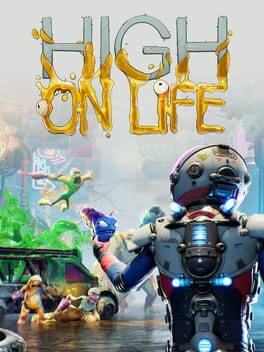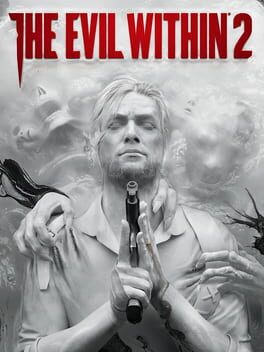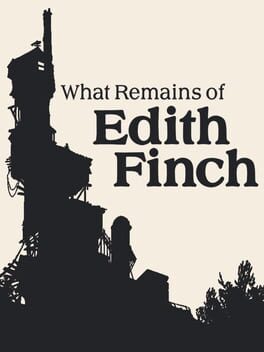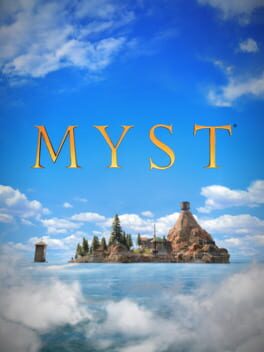Megachile
Bio
Nothing here!
Badges

Noticed
Gained 3+ followers

3 Years of Service
Being part of the Backloggd community for 3 years

Liked
Gained 10+ total review likes

On Schedule
Journaled games once a day for a week straight
071
Total Games Played
000
Played in 2024
006
Games Backloggd
Recently Played See More
Recently Reviewed See More
Tried this because I'd enjoyed the new RE games well enough and heard this was by the same director. I got a decent way into it but almost everything about it was either underwhelming or not really to my taste. The tiresome cliche of the gruff protagonist and his missing daughter, the stylistically incoherent setpieces, the lackluster enemy and environment designs, the uneven and haphazard feel of the levels, everything was just a little off or not well done. It reminds me of Control in a lot of ways, in the fiction, and I was kind of excited to have a game like that deliver a more horrific presentation and a more carefully designed gameplay experience. Neither really manifested so far. The levels seem designed to strongly encourage stealth over combat, much moreso than RE, but stealthing is just very uncomfortable. I hate the way the cover mechanic feels, and I pretty much always ended up sprinting through these encounters or loading a save and finding a way to avoid them entirely. It's clear that the game has combat mechanics it expects you to make more use of than I was able to, and if I were more motivated I'm sure I could have gotten used to it and finished the game, but nothing else about it has given me the impression that would be worthwhile for me.
I know that I can't possibly have missed anything, because Edith Finch forcibly redirects the camera every time a new line of dialogue starts, but I really feel like I must have missed something. The story slides right into episodic tales that are each incomplete on their own, and there's no real framing narrative to give them weight, and they never come together into anything collectively. It's just a bunch of "imaginative" mini game/walking sequences. They vary in style but none are particularly impressive on their own. It reminds me of Ethan Carter; a bit less sense of buildup and letdown here but the same ultimate emptiness.
Myst's reputation, as far as I understood it, was as landmark in dense, obtuse, inscrutable puzzle gameplay. The sort of thing you couldn't get away with making today because gamers demanded things that were more accessible and fast-paced even in puzzle games. And the first impression this remake made validated that for me completely. You immediately find a dozen of what are obviously puzzles, but only one of which is amenable to a trial-and-error solution on its own terms. It seems like there must be some tremendous leaps of logic the game must expect you to make to get a foothold into these puzzles. I felt that way, stuck on everything at once, hoping that the one I did solve would somehow give me a clue to at least one more that would continue to chain off through the rest, wondering how long I would bang my head against this before looking up a hint, until I discovered that in my exploration of the island, I had failed to realize I could activate an elevator that brought me to a room that contained the literal solution to every single one of the beginning puzzles, just written on the wall. The puzzles look so hard because they were never solvable in the first place. They don't work on inscrutable logic, they're just combination locks. At that point my expectations for the game plummeted, and it more less met them.
Having played a decent number of modern puzzle games (Talos Principle and The Witness stand out as the most specific points of reference for Myst), it's hard to justify calling Myst a puzzle game at all. Its "puzzles" are only a step or two above the sort of puzzles you'd find in a Resident Evil game. They're video game puzzles: series of actions that require you to move around a map and interact with certain items (often just all or part of a lock combination) in order to access the next area.
They seem relatively difficult largely because they have a much higher level of friction between the logic of the puzzle and its execution than would be necessary in a game with other mechanics. There is no journal, so you have to write down your own notes. There's a rail-car labyrinth, for some godforsaken reason. I just bungled through on process of elimination myself, but looking up the intended "solution" to this, it's absolutely mindboggling they thought someone might have ever figured this out without information apparently only available in a different part of the game you may or may not have visited yet. If you did know the solution, though, it would still be an incredibly tedious process to input it. There's a timer in one level that requires you to spend 30 seconds or so round trip every time you want to make a guess on the puzzle. The first puzzle I solved requires you to go reset two separate breaker boxes every time you fail.
I was thinking before I went in that it would be nice to play a game that wasn't scared of a player who could think, wasn't afraid to ask the player to think. But Myst is terrified the player will realize there's nothing here to think about. It's constantly throwing red herrings and obstacles in your path and nesting its mechanisms together in a desperate shell game to take your eyes off the fact that there are no real puzzles here.
What I didn't realize about Myst is that, on top of being a puzzle game, it's a keenly '90s fantasy story, relegated to text and environmental storytelling due to technical limitations. On that score it's nothing particularly special; I didn't think the environmental storytelling was particularly effective and the mystery it's meant to convey is a bit inept. And while the remake looks great, the emptiness of all the environments feels more out of place than it might have in the original graphics. You could imagine a game that was mostly about this network of fantasy worlds and shows elements of the actual stories mentioned in the books, with some distinct set of mechanics (whether action, platforming, rpg, adventure game, etc) and the "puzzles" there to pace and structure them. As it is, the fiction of Myst only highlights the inadequacy and emptiness of everything else. The remake is very polished but the experience feels like a basically unfinished game.
Having played a decent number of modern puzzle games (Talos Principle and The Witness stand out as the most specific points of reference for Myst), it's hard to justify calling Myst a puzzle game at all. Its "puzzles" are only a step or two above the sort of puzzles you'd find in a Resident Evil game. They're video game puzzles: series of actions that require you to move around a map and interact with certain items (often just all or part of a lock combination) in order to access the next area.
They seem relatively difficult largely because they have a much higher level of friction between the logic of the puzzle and its execution than would be necessary in a game with other mechanics. There is no journal, so you have to write down your own notes. There's a rail-car labyrinth, for some godforsaken reason. I just bungled through on process of elimination myself, but looking up the intended "solution" to this, it's absolutely mindboggling they thought someone might have ever figured this out without information apparently only available in a different part of the game you may or may not have visited yet. If you did know the solution, though, it would still be an incredibly tedious process to input it. There's a timer in one level that requires you to spend 30 seconds or so round trip every time you want to make a guess on the puzzle. The first puzzle I solved requires you to go reset two separate breaker boxes every time you fail.
I was thinking before I went in that it would be nice to play a game that wasn't scared of a player who could think, wasn't afraid to ask the player to think. But Myst is terrified the player will realize there's nothing here to think about. It's constantly throwing red herrings and obstacles in your path and nesting its mechanisms together in a desperate shell game to take your eyes off the fact that there are no real puzzles here.
What I didn't realize about Myst is that, on top of being a puzzle game, it's a keenly '90s fantasy story, relegated to text and environmental storytelling due to technical limitations. On that score it's nothing particularly special; I didn't think the environmental storytelling was particularly effective and the mystery it's meant to convey is a bit inept. And while the remake looks great, the emptiness of all the environments feels more out of place than it might have in the original graphics. You could imagine a game that was mostly about this network of fantasy worlds and shows elements of the actual stories mentioned in the books, with some distinct set of mechanics (whether action, platforming, rpg, adventure game, etc) and the "puzzles" there to pace and structure them. As it is, the fiction of Myst only highlights the inadequacy and emptiness of everything else. The remake is very polished but the experience feels like a basically unfinished game.







